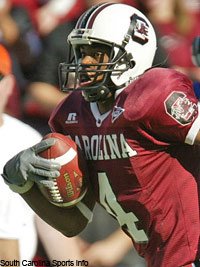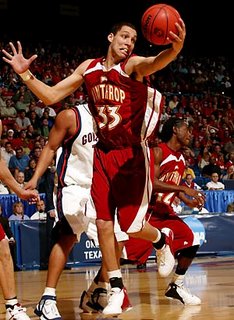COLUMBIA, S.C. (AP) -- "Y'all" isn't welcome in Erica Tobolski's class in voice and diction at the University of South Carolina. And forget about "fixin'," as in getting ready to do something, or "pin" when talking about the writing instrument.
Tobolski's class is all about getting rid of accents, mostly Southern ones in the heart of the former Confederacy, and replacing them with Standard American Dialect, the uninflected tone of TV news anchors that oozes authority and refinement.
"We sort of avoid talking about class in this country, but clearly class is indicated by how we speak," she said.
"Many come to see me because they want to sound less country," she said. "They say, 'I don't want to lose my accent completely, but I want to be able to minimize it or modify it.'"
That was the case for sophomore Ali Huffstetler, who said she "luuuvs" the slow-paced softness of her upstate South Carolina magnolia mouth but wants to be able to turn it on and off depending on her audience.
"I went to New Hampshire to visit one of my best friends and all they kept saying was, 'Will you please talk, can you just talk for me?'" Huffstetler said. "I felt like a little puppet show."
Across the fast-growing South, accents are under assault, and not just from the modern-day Henry Higginses of academia. There's the flood of transplants from other regions, notions of Southern upward mobility that require dropping the drawl, and stereotypes that "y'alls" and "suhs" signal low status or lack of intelligence.
But is the Southern accent really disappearing?
Related Stories
Definition of South, Southern Is Changing
Many Blacks Take Pride in Southern Roots
Yes, Ma'am, There Is Pride in Politeness
Whither the Southern Accent?
Northerners Make Powerful Inroads in Va.
Great Literature Amid Illiteracy
Country Comedy Is an Evolving Tradition
Kentucky's Struggle Stems From Civil War
Will Fajita Become the New Moon Pie?
INTERACTIVES
Southern Accents
That depends what accent you mean. The South, because of its rural, isolated past, boasts a diversity of dialects, from Appalachian twangs in several states to Elizabethan lilts in Virginia to Cajun accents in Louisiana to African-influenced Gullah accents on the coasts of Georgia and South Carolina.
One accent that has been all but wiped out is the slow juleps-in-the-moonlight drawl favored by Hollywood portrayals of the South. To find that so-called plantation accent in most parts of the region nowadays requires a trip to the video store.
"The Rhett-and-Scarlett accent, that is disappearing, no doubt about it," said Bill Kretzschmar, a linguist at the University of Georgia and editor of the American Linguistic Atlas, which tracks speech patterns.
"Blame it on the boll weevil," he said, referring to the cotton pest. "That accent from plantation areas, which was never the whole South, has been in decline for a long time. The economic basis of that culture started going away at the turn of the last century," when the bugs nearly wiped out the South's cotton economy.
Even as the stereotypical Southern accent gets rarer, other speech patterns take its place, and they're not any less Southern. The Upland South accent, a faster-paced dialect native to the Appalachian mountains, is said to be spreading just as fast as the plantation drawl disappears.
"The one constant about language is, it's always changing," Kretzschmar said. "The Southern accent is not going anywhere. But you have all kinds of mixtures and changes."
For a long-term study on whether the Southern accent is disappearing, University of Georgia linguists went to Roswell, Ga., an Atlanta suburb that is just the kind of transient place that leads to the death of indigenous dialects. It's packed with strip malls and subdivisions with no cotton patches or peach trees in sight.
"I don't hear it," 21-year-old Roswell native Amanda Locher said of the accent. She's never lived outside the South, but even Northern newcomers question her Southernness. "People tell me I sound like I'm from up North. To hear a true Southern accent, you'd have to go deeper south than here."
Adam Mach, a 25-year-old tire shop worker who moved to the Atlanta suburbs from Lafayette, La., has got a noticeable Louisiana lilt. But he said his accent seldom makes conversation because the area is such a melting pot of newcomers.
"Everybody I meet's not from here," he shrugged.
North Carolina State University linguist Walt Wolfram said it's a misconception among Southerners that Yankee newcomers are stamping out traditional speech. More likely, he said, is that newcomers pick up local speech patterns.
"When people move here and don't think they've changed at all, they go home and people say, 'Wow. You've turned Southern.' They pick up enough to be identified as Southern. So it's still there, still strongly identified with the South," Wolfram said.
But that doesn't mean that population change in the South isn't chipping away at old-timey dialects, especially in cities. Wolfram said the "dearest feature" of the Southern accent - the vowel shift where one-syllable words like "air" come out in two syllables, "ay-ah" - is certainly vanishing. Other aspects - such as double-modal constructions like "might could" - are still pervasive.
Kretzschmar, who has recorded Roswell speakers for three years, said his suburban Atlanta studies have backed up his suspicion that the Southern accent is morphing along with the urbanizing South.
"It's not really disappearing, but the circumstances of living make it different," he said. "People don't have connections with their neighbors to maintain their way of speech.
"The circumstances of how people get together and talk in the cities have changed; they're not constantly talking to people who talk just like them. But in the South outside the cities, you have a lot of similarities."
Georgia-bred humorist Roy Blount Jr. understands that people with strong Southern accents are often perceived as "slow and dimwitted." But he thinks it's "sort of a shame" that people should feel the need to soften or even lose their accents.
"My father, who was a surely intelligent man, would say `cain't'. He wouldn't say `can't.' And, `There ain't no way, just there ain't no way.' You don't want to say, `There isn't any way.' That just spoils the whole thing," Blount said.
"I just think that there's a certain eloquence in Southern vernacular that I wouldn't want to lose touch with ... you ought to sound like where you come from."
But never fear. There are still plenty of professions that thrive on a good Southern twang - from preachers to football coaches to a certain breed of courtroom litigators.
And South Carolina's Tobolski, an Indiana native who came south eight years ago, can help there, too. As a private coach she has even taught a politician she wouldn't name how to ratchet up his Southern accent to make him appear more folksy before certain crowds - a technique she calls "code switching."
"He didn't want to lose his dialect entirely. He just wanted to be able to adapt."
"I don't think that any regional accent is going to be eliminated," she said. "There's still people who want to hang on to how they sound. That's who they are. That's their identity. And that goes from New Jersey to Minnesota to Wyoming to Georgia."






